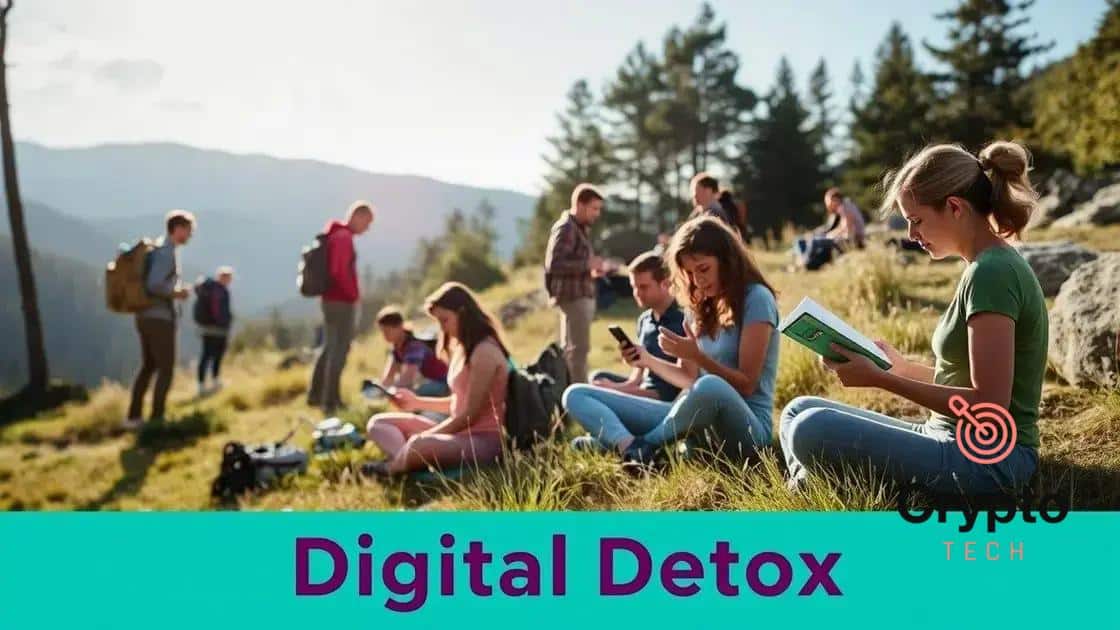Trends in digital detox culture among Gen Z

Trends in digital detox culture among Gen Z highlight a growing emphasis on balancing technology use with mental health, promoting awareness of screen time impacts and fostering mindfulness through methods like outdoor activities and tech-free periods.
Trends in digital detox culture among Gen Z show a fascinating shift in how young people view their connection to technology. Have you noticed more friends opting for time away from their screens? This growing interest invites us to explore its significance.
Understanding digital detox: What is it?
Understanding digital detox is essential in today’s tech-driven world. It refers to taking a break from digital devices to reconnect with ourselves and our surroundings. Many people, especially in Gen Z, are realizing the need to step back from screens and find balance in their lives.
A digital detox involves intentionally disconnecting from smartphones, social media, and other online platforms for a specific period. This practice allows individuals to focus on their mental health and well-being, promoting mindfulness and genuine social interactions.
Why is digital detox important?
Engaging in a digital detox can lead to numerous benefits:
- Improved mental clarity and focus.
- Better sleep quality by reducing screen time before bed.
- Enhanced relationships through in-person interactions.
- Increased productivity and creativity when offline.
The growing obsession with technology has led many to experience feelings of anxiety, stress, and isolation. Recognizing these effects, Gen Z has become more proactive in addressing their digital habits. Understanding digital detox is the first step towards a healthier lifestyle.
Incorporating a detox into your routine doesn’t have to be overwhelming. Start slowly by designating specific hours of each day as screen-free time. Use this time to engage in hobbies, exercise, or spend time with friends and family. The goal is to create a sense of balance.
Ultimately, a digital detox is not just about disconnecting; it’s about reconnecting with yourself and the world around you. As you explore this practice, you may discover new interests and deepen your existing relationships, enhancing your overall well-being.
Reasons behind the rise of digital detox among Gen Z
Many young people today are discovering the need for a digital detox. Understanding the reasons behind the rise of digital detox among Gen Z reveals how they prioritize their mental health and well-being.
One major reason is the overwhelming nature of social media. Constant notifications and the pressure to stay connected can lead to anxiety and stress. As a result, Gen Z seeks to reclaim their time and focus on what truly matters in life.
Rise in Mental Health Awareness
With growing conversations around mental health, many young people are recognizing the impact of continuous digital engagement. They see that being online all the time can lead to feelings of inadequacy and loneliness.
- Social media often compares users to unrealistic standards.
- Increased screen time can lead to sleep issues.
- Detoxing from digital devices can create more time for self-care.
Moreover, Gen Z values authentic connections. Engaging in face-to-face interactions helps build stronger relationships. By disconnecting from their devices, they are more present and engaged with friends and family.
The influence of digital fatigue cannot be ignored. Many feel burnt out from constant connectivity. Sensing this fatigue, Gen Z sees the importance of a digital detox to recharge and find balance in their lives.
Finally, there’s a stronger push for mindfulness. Young people are realizing the benefits of being in the moment. Through activities like meditation, outdoor adventures, or simply reading a book, they embrace experiences that help ground them.
Impact of social media on mental health
The impact of social media on mental health cannot be ignored, especially among young people like Gen Z. Many studies suggest that excessive use of social media can lead to negative mental health outcomes.
Scrolling through countless posts daily can create feelings of inadequacy. When users see others’ highlight reels, it’s easy to compare their own lives unfavorably. This comparison can result in low self-esteem and increased anxiety.
Connections and Isolation
Interestingly, while social media connects us, it can also lead to feelings of isolation. Many users report feeling lonely despite having a large online following. Real-life interactions can become less frequent, causing individuals to feel disconnected from those around them.
- Online interactions often lack the depth of face-to-face conversations.
- People may prioritize likes and comments over genuine relationships.
- Isolation can lead to anxiety and depression for many users.
Another factor is cyberbullying, which has risen significantly with the advent of social media platforms. Victims of cyberbullying can experience severe emotional distress, leading to long-term psychological effects.
Even the constant consumption of news on social media can negatively affect mental well-being. Exposure to negative news can create a sense of helplessness and sadness, contributing to overall anxiety levels. By limiting social media use, individuals may find peace and improve their mental health.
Seeking a balance between on-screen time and real-life interactions is crucial. Many young people are now recognizing the need to take breaks from social media to focus on their mental wellness.
Popular methods for digital detox

Many individuals are discovering the benefits of taking a break from technology. Adopting popular methods for digital detox can help people reconnect with themselves and their surroundings.
One effective method is setting specific screen-free hours. This simple approach allows individuals to step away from their devices during designated times, such as during meals or before bed. By sticking to these hours, they can focus on personal relationships and activities without distractions.
Engaging in Outdoor Activities
Another popular method is spending time outdoors. Nature has a unique ability to refresh the mind and improve mood. Whether it’s hiking, biking, or just taking a walk in the park, being outside can provide a break from technology.
- Outdoor activities encourage physical health.
- Nature can reduce feelings of stress and anxiety.
- Exploring new places can spark creativity.
Mindfulness practices, such as meditation or yoga, are also great tools for a digital detox. These activities promote awareness and help individuals to focus on the present moment. They can provide a much-needed break from the chaos of digital life, helping to calm the mind.
Additionally, pursuing hobbies like reading, painting, or cooking can serve as excellent distractions from screens. Focusing on a passion project often leads to a greater sense of fulfillment and joy. These activities not only keep individuals entertained but also encourage personal growth.
Lastly, many people are finding success in digital detox retreats. These programs often involve extended periods away from technology, surrounded by nature and like-minded individuals. Participants can fully immerse themselves in activities designed to promote well-being and reflection.
The future of digital detox practices
The future of digital detox practices holds exciting possibilities as people become more aware of their tech habits. As our lives become increasingly intertwined with technology, finding balance will be essential.
One emerging trend is the integration of technology into detox practices. For example, apps that track screen time will continue to gain popularity, helping individuals monitor their digital usage. Users can set goals to reduce screen time and receive reminders to take breaks.
Workplace Wellness Programs
Companies are also recognizing the value of digital detox. Many are implementing wellness programs encouraging employees to unplug during work hours. These initiatives might involve tech-free zones, scheduled breaks, or even incentive programs for those who participate in digital detox activities.
- Employers can provide workshops on mindfulness and digital wellness.
- Creating a supportive work culture encourages healthy tech habits.
- Group activities, such as nature outings, promote team bonding without technology.
Additionally, as mental health awareness grows, more people will seek out professional guidance for digital detox. Therapists and counselors may incorporate digital detox plans into treatment strategies. This could include personalized detox plans tailored to individual needs.
Community initiatives focused on mindfulness and well-being are also likely to expand. Workshops, retreats, and seminars will offer structured environments for individuals to learn about the benefits of reducing screen time. They provide a space to build skills and practice mindfulness.
As educational institutions recognize the impact of technology on concentration and learning, schools may introduce digital detox practices into their curriculum. Programs that teach students how to manage their screen time effectively can lead to healthier habits from a young age.
FAQ – Frequently Asked Questions about Digital Detox Practices
What is digital detox?
Digital detox is a period during which a person refrains from using electronic devices, particularly smartphones and social media.
Why is digital detox important for mental health?
It helps reduce stress and anxiety by allowing individuals to reconnect with the real world and improve their mental clarity.
How can I start my own digital detox?
You can start by setting specific hours each day to be screen-free or participating in outdoor activities that do not involve technology.
Are there any tools to help with digital detox?
Yes, there are apps that track screen time and remind you to take breaks, helping you manage your digital usage better.





